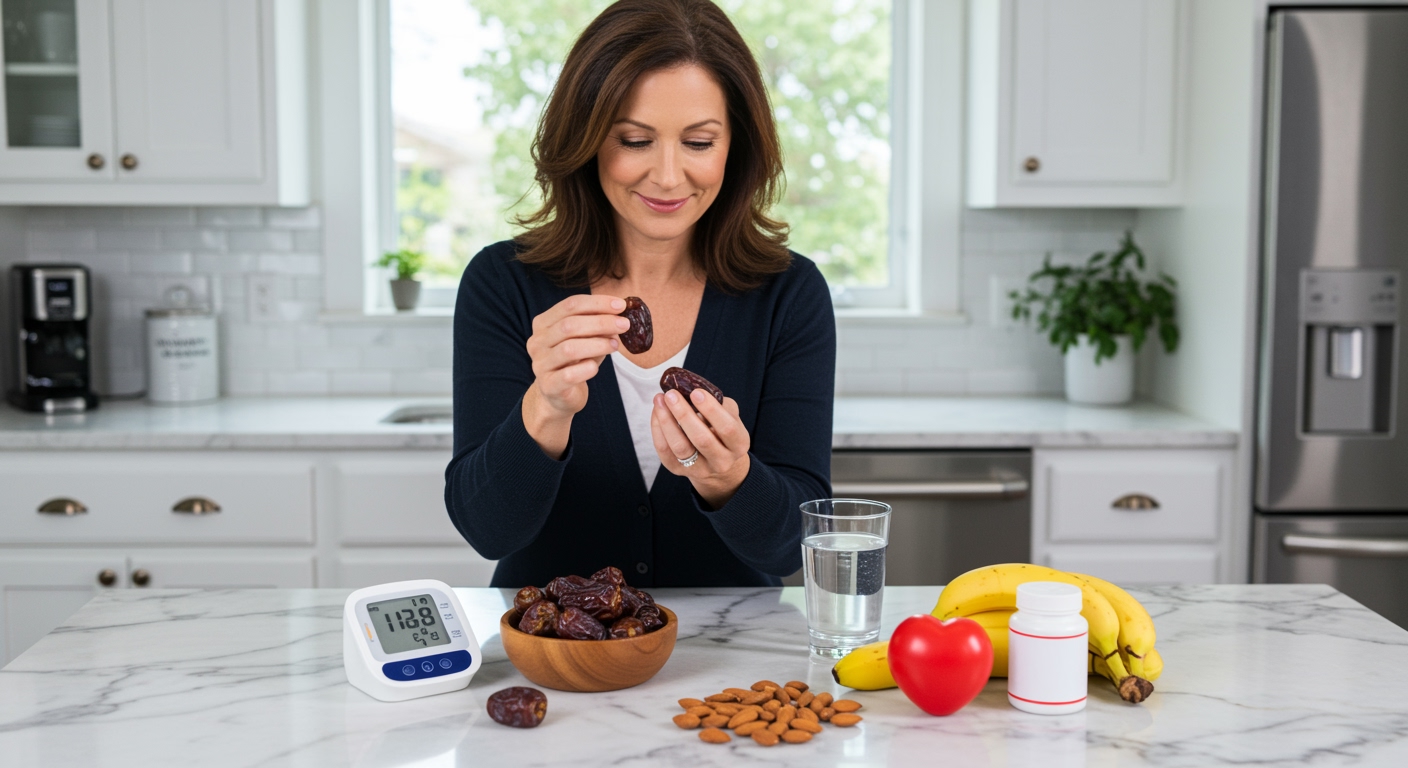✪ Key Takeaway: Dates can help lower blood pressure due to their high potassium content and natural compounds that support heart health.
Introduction
Your doctor just told you to watch your blood pressure and now you are questioning every food choice.
You love dates but worry their sweetness might spike your numbers and harm your cardiovascular health.
Hi, I am Abdur, your nutrition coach and today I am going to explain exactly how dates affect your blood pressure and whether you should include them in your heart-healthy diet.
What Makes Dates Special for Blood Pressure?
Dates pack an impressive potassium punch that directly benefits your cardiovascular system.
A single Medjool date contains about 167 milligrams of potassium, which helps your body balance sodium levels naturally.
When you consume adequate potassium, your kidneys excrete more sodium through urine, reducing the fluid volume in your blood vessels.
This mechanism directly lowers the pressure against your artery walls, creating a protective effect for your heart.
Research shows that people who consume 3,500-4,700 milligrams of potassium daily experience significant blood pressure reductions compared to those with lower intake.
Dates also contain magnesium and fiber, two additional nutrients that support healthy blood pressure through different pathways in your body.
✪ Fact: Three Medjool dates provide about 500 milligrams of potassium, roughly 15% of your daily needs.
How Much Sugar Should Concern You?
The natural sugars in dates do not cause the same blood pressure spikes as processed sugars found in candy or sodas.
Dates contain fructose, glucose, and sucrose bound with fiber, which slows their absorption into your bloodstream.
This slower release prevents the rapid insulin spikes that can contribute to blood vessel inflammation and increased blood pressure over time.
One Medjool date contains about 16 grams of natural sugar, but the accompanying 1.6 grams of fiber helps moderate its impact on your blood sugar levels.
Studies indicate that whole fruits with natural sugars, including dates, do not increase cardiovascular disease risk when consumed in reasonable portions.
The key lies in portion control and choosing dates over processed sweets that lack beneficial nutrients and protective compounds.
✪ Pro Tip: Limit yourself to 2-3 dates per day to maximize benefits while controlling sugar intake.
What Does the Research Actually Show?
Scientific evidence consistently supports the blood pressure benefits of potassium-rich foods like dates.
A comprehensive analysis published in recent cardiovascular research demonstrates that increasing potassium intake by 1,000 milligrams daily reduces systolic blood pressure by 2-4 mmHg.
This reduction might seem small, but it translates to a significant decrease in heart attack and stroke risk across populations.
The George Institute for Global Health found that boosting potassium intake is particularly effective for people with existing high blood pressure.
Dates also contain antioxidant compounds called flavonoids that protect blood vessel walls from oxidative damage and inflammation.
These protective effects work synergistically with potassium to create a more comprehensive approach to cardiovascular health than single-nutrient supplements.
✪ Note: The blood pressure benefits of dates work best as part of an overall heart-healthy eating pattern.
When Should You Be Cautious About Dates?
People with diabetes or prediabetes need to monitor their date consumption more carefully due to the natural sugar content.
If you take blood pressure medications, especially ACE inhibitors or potassium-sparing diuretics, consult your doctor before significantly increasing potassium intake.
Excessive potassium can cause hyperkalemia in people with kidney disease or those taking certain medications that affect potassium metabolism.
Always check with your healthcare provider if you have chronic kidney disease, as your potassium needs may be different from healthy individuals.
Some people experience digestive discomfort when eating too many dates due to their high fiber content and natural sugars.
Start with one date per day and gradually increase to assess your individual tolerance level and blood sugar response.
✪ Pro Tip: Monitor your blood pressure regularly when adding any new foods to track individual responses.
How Should You Include Dates in Your Diet?
The best approach is incorporating dates as a natural sweetener replacement rather than an additional snack.
Use chopped dates in oatmeal, yogurt, or homemade energy balls instead of adding refined sugar or artificial sweeteners.
Pair dates with protein or healthy fats like nuts to slow sugar absorption and create more balanced blood sugar responses.
Fresh Medjool dates offer the highest potassium content, but dried dates work well too and have a longer shelf life.
Avoid dates stuffed with processed ingredients or covered in additional sugars, as these additions negate the health benefits.
Time your date consumption around physical activity when your body can better utilize the natural sugars for energy production.
✪ Fact: Eating dates with almonds creates a perfect balance of potassium, magnesium, and healthy fats for heart health.
The Bottom Line
Dates can be a valuable addition to your blood pressure management strategy when consumed in appropriate amounts.
Real nutrition is about choosing whole foods that work with your body, not against it.
I would love to hear about your experience with dates and blood pressure management, so please share your questions or feedback in the comments below.
References
At NutritionCrown, we use quality and credible sources to ensure our content is accurate and trustworthy. Below are the sources referenced in creating this article:
- PubMed: Potassium and Blood Pressure Research
- The George Institute: Boosting Potassium is Key for Blood Pressure Control
- PMC: Potassium and Cardiovascular Health
- American Heart Association: Potassium and Heart Health





